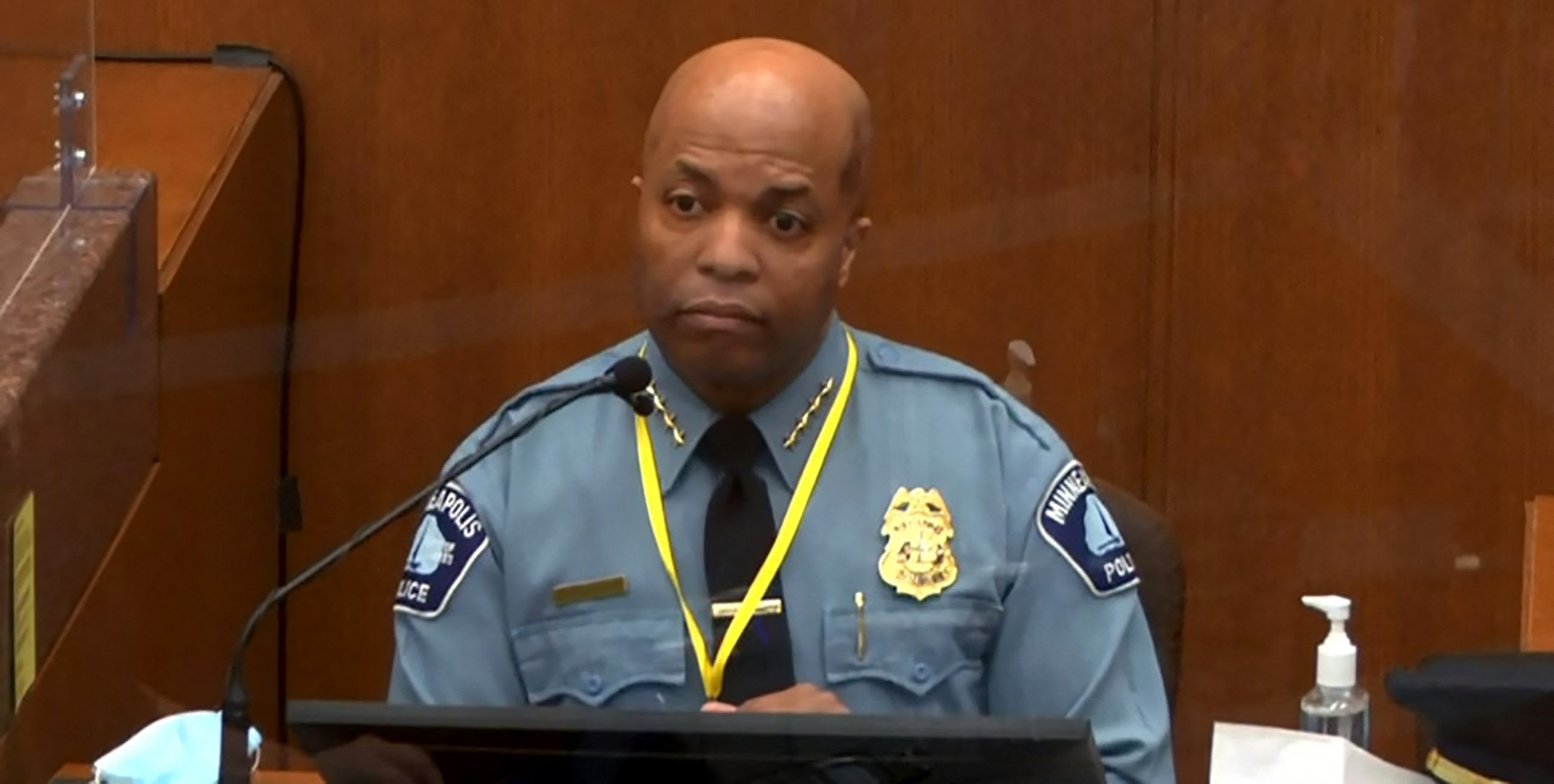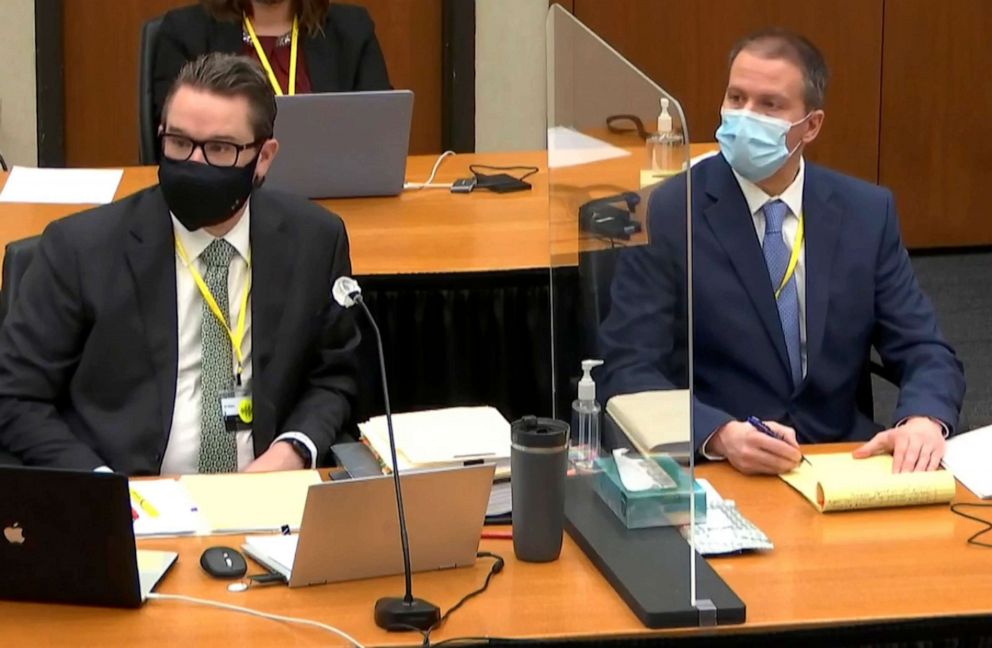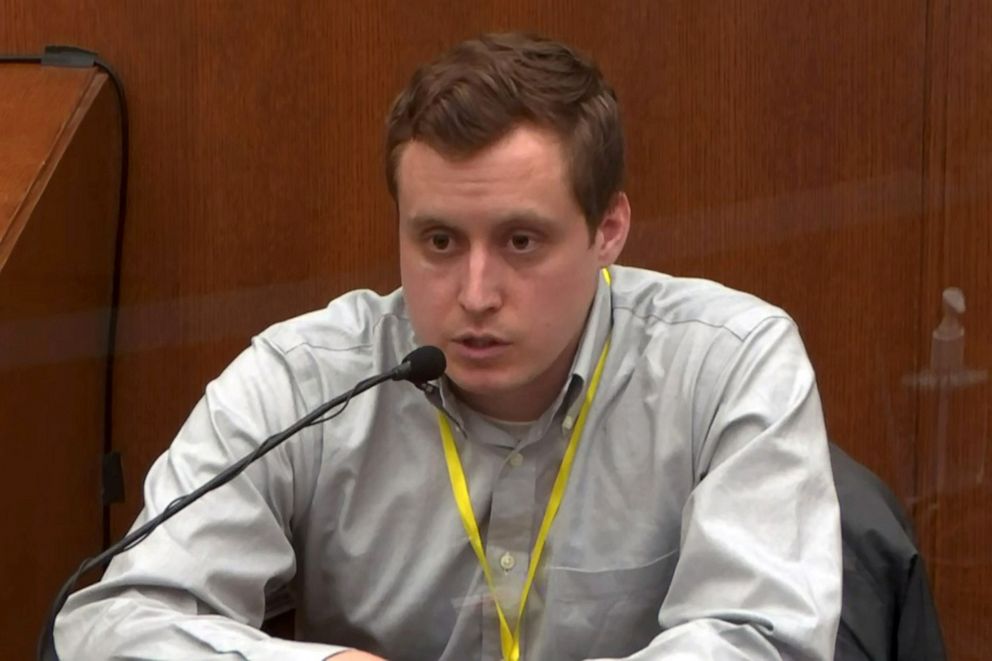Key takeaways from Day 6 of Derek Chauvin's trial in George Floyd's death
"I absolutely agree that violates our policy," a chief says of the force used.
Minneapolis Police Chief Medaria Arradondo took the witness stand in the murder trial of Derek Chauvin on Monday and testified the former officer violated numerous use-of-force and ethics policies in the fatal arrest of George Floyd, including the force's underlying motto to "protect with courage and serve with compassion."
Arradondo, the highest-profile witness yet to testify for the prosecution, went over page after page of his police force's policies on use-of-force, de-escalation and best practices, some of which he personally wrote.
Prosecutor Steve Schleicher asked Arradondo if he would describe the force Chauvin used on Floyd on May 25, 2020, as proper and according to the training of Minneapolis police officers.
"I absolutely do not agree with that," Arradondo answered. "That action is not de-escalation and when we talk about the framework of our sanctity of life and when we talk about the principles and values that we have that action goes contrary to what we're taught."

Arradondo said he drew his conclusions based on police body-camera, surveillance and bystander video he reviewed in the hours after Floyd was pronounced dead.
After being shown a photo, described as "Exhibit 17," of Chauvin digging his knee into Floyd's neck for 9 minutes and 29 seconds while the handcuffed 46-year-old Black man was prone on the ground with two other officers holding him down, the chief said the tactic was not the type of "conscious neck restraint" his officers have been trained to use.
"A conscious neck restraint by policy mentions light to moderate pressure. When I look at Exhibit 17 and when I look at the facial expression of Mr. Floyd, that does not appear in any way, shape or form that that is light to moderate pressure," he said.
Asked if the restraint Chauvin used on Floyd was a violation of department policy, Arradondo answered, "I absolutely agree that violates our policy."
"It has to be objectively reasonable. We have to take into account the circumstances, information, the threat to the officer, the threat to others, the severity of that. So that is not part of our policy. That is not what we teach and that should be condoned," he added.
Schleicher asked Arradondo if he has an opinion on when Chauvin should have stopped using the restraint on Floyd.
"Once Mr. Floyd, and this is based on my viewing of the videos, had stopped resisting and certainly once he was in distress and trying to verbalize that, that should have stopped," Arradondo said. "To continue to apply that level of force to a person proned out, handcuffed behind his back, that in no way shape or form is anything that is by policy. It's not part of our training and it is certainly not part of our ethics or values."
Arradondo also said that it was troubling to see that Chauvin, and the other officers who restrained Floyd, failed to provide first aid even though they had checked for a pulse and not found one.
"I agree the defendant violated our policy in terms of rendering aid," Arradondo said.
Arradondo was asked to read a key section of his department's procedure manual as Schleicher sought to establish how it pertained to the encounter Floyd had with Chauvin and three other officers involved in the arrest, but was precluded from discussing his decision in front of the jury.

"Be courteous, respectful, polite and professional. Ensure that the length of any detention is no longer than necessary to take appropriate action for the known or suspected offense," Arradondo said as he read the training manual.
Arradondo also went into great detail about the de-escalation procedures officers are mandated to follow, saying it's really about attempting to stretch out "time, options and resources."
He said officers are trained to know how to assess a subject they are encountering for medical conditions, mental impairment, developmental disabilities and whether they are in the throes of a behavioral crisis or under the influence of drugs. The officers are also retrained on this annually, Arradondo said.
He said Floyd did not appear to be a threat to the officers or other citizens during the incident, and added that Floyd should have never been arrested for the minor offense of trying to buy a pack of cigarettes with a phony $20 bill, which is a misdemeanor.
He said that instead of de-escalating the situation, Chauvin's actions escalated it.
"It's really primarily trying to provide an opportunity to stabilize a situation, to de-escalate it. The goal is having a safe and peaceful outcome," Arradondo testified, reading from the department's code of ethics.
In one dramatic moment, Arradondo pointed to Chauvin sitting at the defense table and identified him as wearing a blue suit, light blue tie and white shirt.
The chief terminated Chauvin's 19-year-career as a police officer a day after his encounter with Floyd.
During cross-examination, Chauvin's attorney, Eric Nelson, attempted to undermine Arradondo's earlier testimony, by asking when the last time the chief had made an arrest of a combative person.
"It's been a number of years," Arradondo said.
Head police trainer testifies
Minneapolis police Inspector Katie Blackwell, who was the department's training commander at the time of Floyd's death, testified that Chauvin was fully trained in the most current procedures and practices, and had undergone an in-service retraining in everything from defensive tactics to first aid in March of 2020.
Blackwell testified that she has known Chauvin for nearly 20 years and even selected him to be a field training officer. She said Chauvin went through the department's field-training officer program in 2018.
"We were trying to make sure that they understood what the recruits are being taught because they're going to evaluate them out there and they're the closest thing to a supervisor that that young recruit officer has," Blackwell said.
She was shown a photo of Chauvin kneeling on Floyd's neck and asked by Schleicher if that was a training technique taught at the time she was overseeing the training unit.
"It is not," Blackwell responded.
When asked why, Blackwell said, "I don't know what kind of improvised position that is. So, it's not what we train."
Doctor who pronounced Floyd dead
Dr. Bradford Lagenfeld, who declared Floyd dead, was the first witness called to testify for the protection on Monday and said Floyd likely died from asphyxia.
Langenfeld, who was a senior resident in the emergency room at Hennepin County Medical Center in May 2020, when Floyd died, detailed the feverish pace he and his team took in performing a series of procedures to determine if there was even a chance to revive Floyd, at one point cutting open the patient's chest.
Langenfeld was the senior resident on duty in the emergency room when George Floyd was brought to Hennepin County Medical Center. He took over Floyd's care from the paramedics who testified last week that Floyd's heart had "flatlined" and that, in layman's terms, he was dead when they transported him to the hospital.

The physician testified that he believed, based on the tests he was able to run at the hospital and also the reports he received from the paramedics, that the primary reason for Floyd's cardiac arrest was a lack of oxygen, or asphyxia, and not a heart attack or drug overdose as the defense contends.
He also said the lack of first aid rendered to Floyd as the officers waited for paramedics to arrive dramatically reduced the chances of reviving Floyd, saying that survival drops 10% to 15% each minute CPR is not administered.
On cross-examination, Nelson attempted to tie Floyd's death to fentanyl and methamphetamine -- drugs that were found in his system during an autopsy. Langenfeld agreed with Nelson that the use of those drugs can cause shortness of breath and suppress a person's breathing.